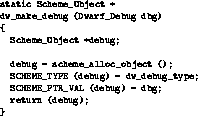
Figure 8: An object constructor



Scheme as defined in its standard has the following data types:
boolean, list, symbol, number, character, string, vector, and
procedure. While Scheme in its current form does not allow the
creation of user-defined types, the libscheme system allows
users to extend the type system with new types by calling the
scheme_make_type() function with a string representing the name
of the new type. This function returns a type object that can be used
as a type tag in subsequently created objects. Normally, types are
created in a file's initialization function and objects of the new
type are created using a user-defined constructor function that
allocates and initializes instances of the type.
In figure 8 we see the constructor for the
dw_debug_type type from our dwarfscheme example. It
accepts an object of type Dwarf_Debug, a pointer to a C
structure defined in the libdwarf library, allocates a new
Scheme_Object, sets the object type, and stores the pointer to
the foreign structure into the ptr_val slot of the object.

Figure 8: An object constructor
It is often convenient to define a macro that checks whether a
libscheme object is of a specified type. The macro defined in
dwarfscheme for the DWARF debug object looks like this:
#define DW_DEBUGP(obj) (SCHEME_TYPE(obj) == dwarf_debug_type)The `P' at the end of
DW_DEBUGP indicates that the macro is
a predicate that returns a true or false value. All of the builtin
types have type predicate macros of this form (e.g.,
SCHEME_PAIRP, SCHEME_VECTORP, etc.).